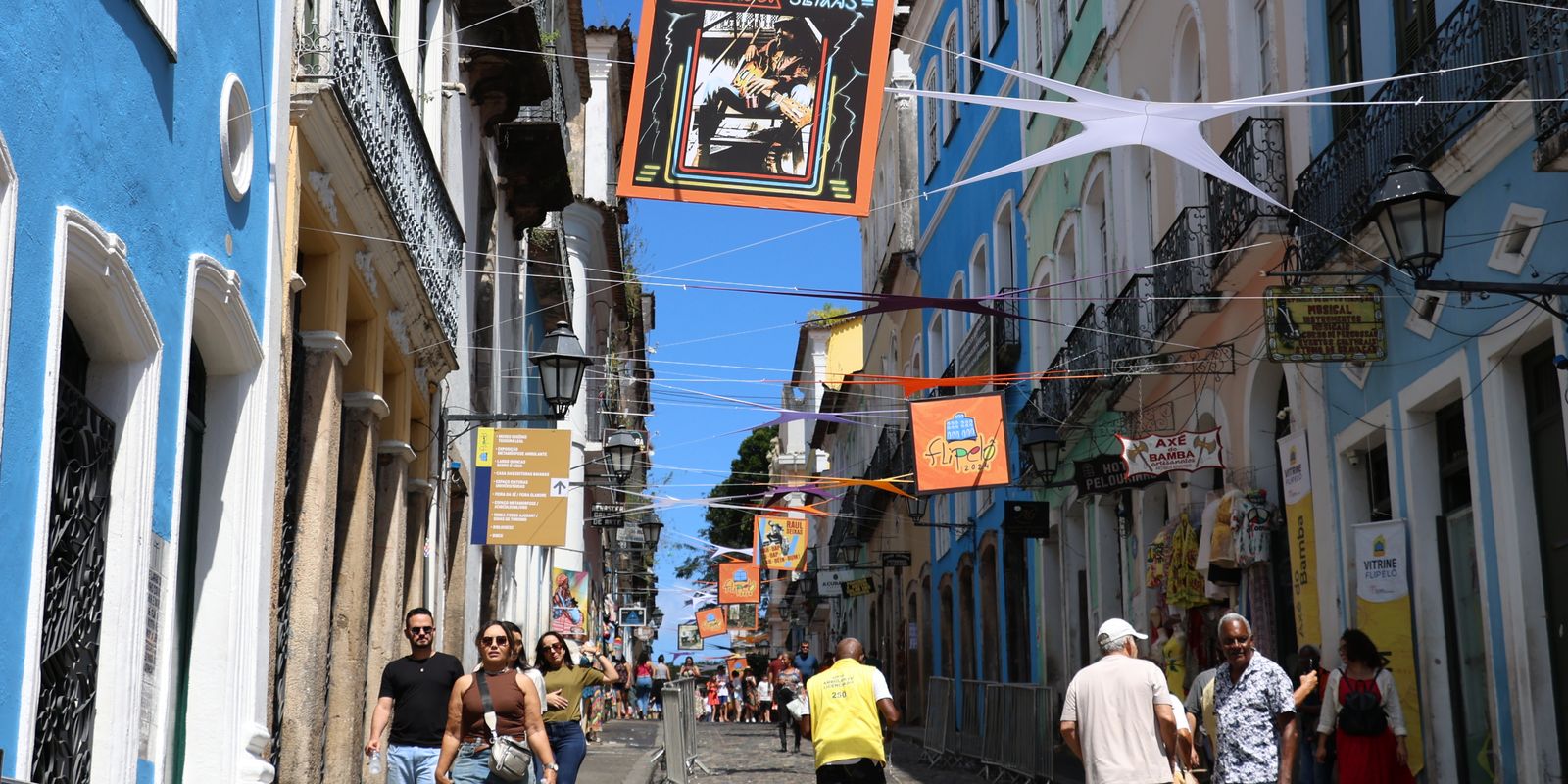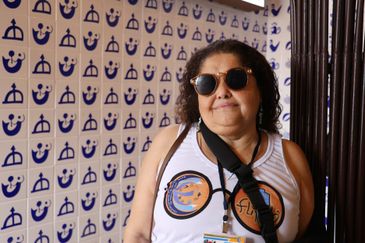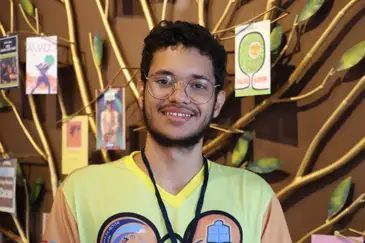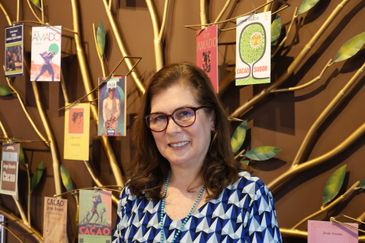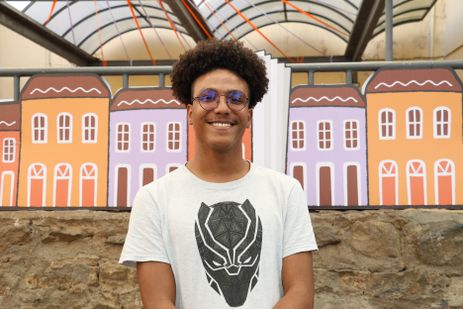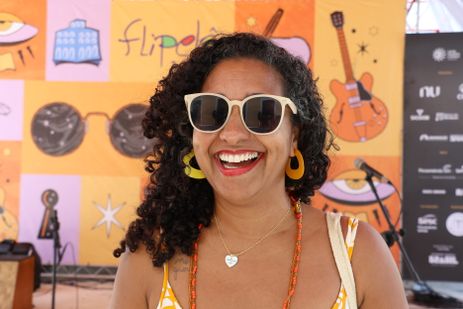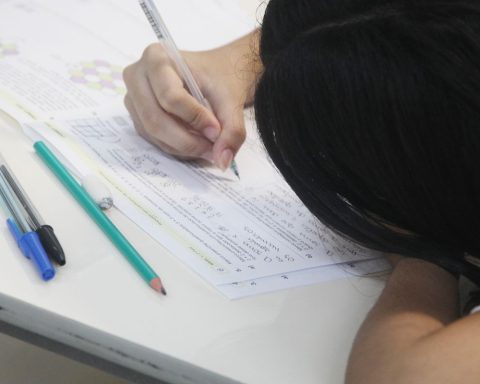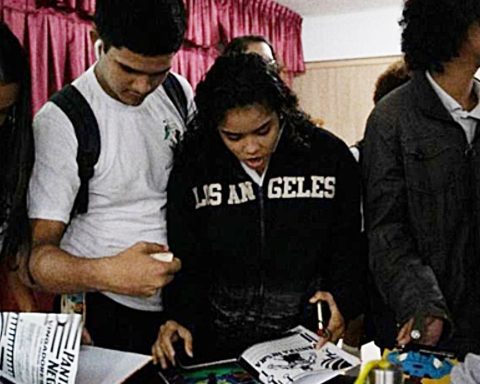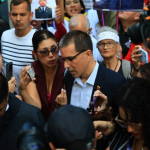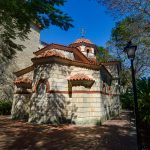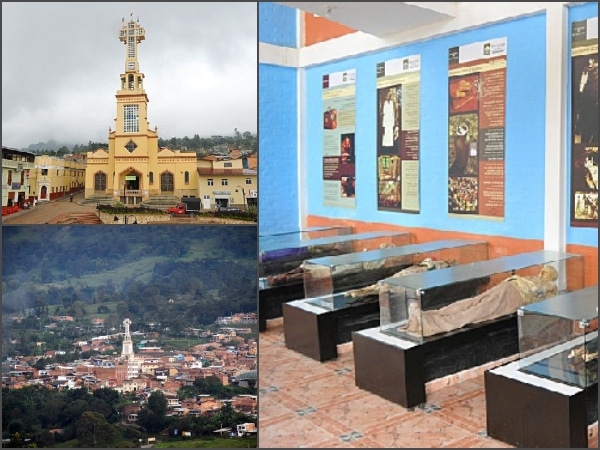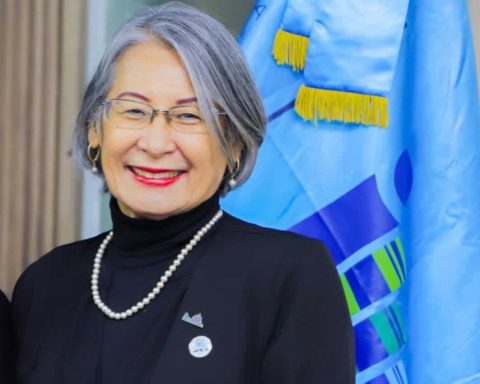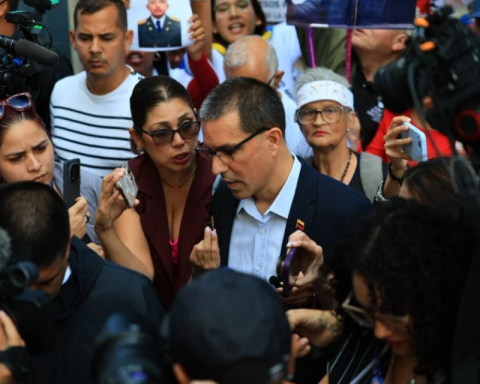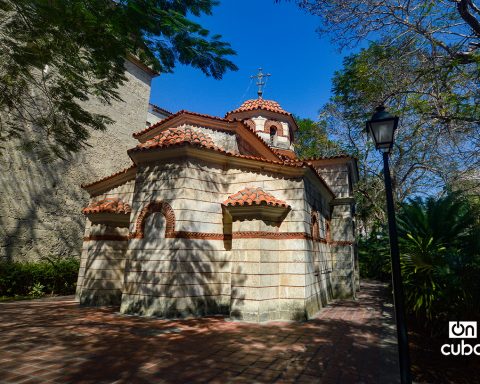It was from Ibititá, in the interior of Bahia, that a group of students and teachers from the Colégio Estadual do Campo de Ibititá left by bus in the early hours of last Wednesday (7). They arrived in Salvador ten hours later, to participate in the largest literary cultural event in Bahia: the Pelourinho International Literary Festival (Flipelô).
For the first time at the festival, the group – made up of four classes from the third year of high school – even made a special t-shirt to wear at the literary festival, recalling the graphic elements that are used by Flipelô this year.
“We made a shirt to differentiate ourselves and make life easier for students. And we thought about making a blouse with Flipelô’s name, to pay tribute to this. And we also took the opportunity to work with Raul Seixas [o homenageado deste ano da Flipelô]. We use the glasses [na camiseta] as a symbol of Raul”, said Eliene Alecrim da Silva, 58 years old, philosophy teacher and life project at the Campos de Ibititá State School.
In an interview with Brazil Agencythe teacher said that the excursion aimed to show the practical part of the theoretical knowledge that is learned in the classroom.
“We have a project called Aula Viva, where we try to see things, study and witness each moment and each space. We leave the classroom to be where history really happens,” said the teacher.
“We won an award for this project and, with the money, we decided to bring the students to Salvador. We came for the literary festival, but this is also an opportunity for students who have never been to Salvador and who don’t know the sea, to go to the beach for the first time and go to a concert for the first time. The main reason was Flipelô, but we took advantage of the moment so that these students could travel through knowledge. We studied the theory in the book and here, the practice,” she said.
One of these students is the young Herick Marques Dourado Santos, 17 years old, who participated in this excursion. “I think it’s really cool, actually. The things here are beautiful, they’re different from our region. So I’m really enjoying seeing it, I’m finding everything that’s happening here interesting. It’s the first time.” [que estou aqui]”, he said.
Another student who accompanied the group was Dioclésio Rodrigues da Silva, 18 years old. He even took advantage of his participation in Flipelô to buy a book: “I think it’s wonderful, I loved the trip. I learned more about the culture here, I got to know the literary festival”, he said.
“This is a learning experience. Reading is important to improve reading habits, the way you speak and to learn new things,” said the student.
For teacher Eliene, Flipelô allows her students to get closer to book writers, in addition to stimulating and “enchanting” them to the habit of reading and knowledge.
“We have to do this kind of awakening [para a leitura] because the internet has taken a lot of kids away from books. The library is kind of empty today because they are more lost in social media. We have to try [estimulá-los] much more for reading”, added the teacher.
According to Angela Fraga, executive director of the Fundação Casa de Jorge Amado and coordinator of Flipelô, several caravans from different regions of the state have attended the event since its second edition.
“Schools and caravans from the countryside always come. This started to happen in the second edition and now, in our eighth edition, we are seeing it clearly. Schools from the outskirts also come. We have an art educator who works in this direction too, going to the schools and organizing with the principals so that they come to Pelourinho. And this year, we were also able to activate private schools,” he said.
This year’s edition
Inspired by the Paraty International Literary Festival (Flip), Flipelô has been taking place since 2017 and was created with the aim of preserving and valuing the memory of the writer Jorge Amado, the culture and art of Bahia and encouraging literature, especially among young people.
In addition to a literary program and spaces for debates, autograph sessions, storytelling, book launches, poetry readings and book sales, Flipelô also promotes showstheatrical performances and even exhibitions.
“Flipelô is multilingual. Literature is a main theme, but all languages, such as photography, visual arts, cinema and theater, are with us. Music, which is a must in Bahia, is also with us,” says Angela.
In an interview with Brazil Agencythe event coordinator said that the public’s turnout this year “is incredible and diverse”.
“The event is very interesting because it is democratic, it is free and it takes place in all spaces in Pelourinho, even in more unusual institutions, like a bakery, which promotes its activity and we help to publicize it.”
One of the spaces that the event coordinator mentioned as the most adorable this year was the CCR Mabel Velloso Institute, where there are activities aimed at children. “We gave it a boost and it is charming,” she said.
Another place that is one of Angela Fraga’s favorites is Vila Literária, a space that was set up in Largo Teresa Batista and was dedicated to comic book lovers. This was also the favorite place of student Herick, who came from Ibititá. “I wanted to stay there longer to see everything because I was enjoying the authors’ conversations, how they write the book and seeing their creativity,” he said.
Origins
It was at Vila Literária that we met accounting student Ícaro Ferrer, 22, who has been attending Flipelô for a few years. “This is a wonderful party for us to be able to perpetuate our origins and, in addition, to bring new people to literature, perpetuating this beautiful idea of books and the stories that we love to read,” he said.
Ferrer was at Vila Literária because of the comic book authors and bloggers: “literature itself is already something that inspires us to be here. And since Flipelô puts on this incredible festival, there’s no way we couldn’t be here.”
Actress, artist and educator Mariana Freire dos Santos, 46, was at the Sesc-Senac space to see a children’s show. “I’m here for the second theater show. I have an 11-year-old daughter and we came to see the Adventures of Crazy Beautywhich took place on Thursday. On Saturday I came to see this musical show by Deco Simões and Karina de Faria.”
For her, the festival is a necessary event: “Flipelô is a necessary event for the city because it engages with literature in such a playful way, with various platforms, with music, theater, dance, and provides an immersion for all ages. And this is within the historic center, which is very important because it engages with our Afro-Amerindian culture. It is a diverse, plural event and it is a delight to participate in.”
Mariana believes that the importance of Flipelô goes beyond literature.
“We need to have free cultural events that everyone can access. And here I am talking about people who often do not have the financial means to attend or participate. Here [na Flipelô] There is this artistic exchange, artists see other artists, people who are part of the audience and the public are able to appreciate and learn about them. I imagine that a person, for example, who doesn’t read, could enter an event like this where there is a discussion with authors and, suddenly, become interested in reading a book and seeing shows or enjoying a cultural activity.”
*Reporter and photographer Rovena Rosa traveled at the invitation of the CCR Institute, sponsor of Flipelô.
